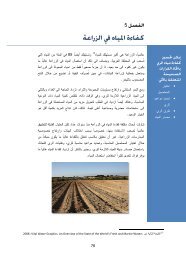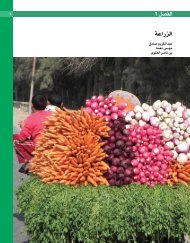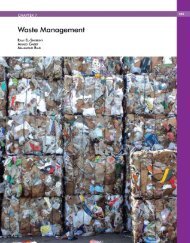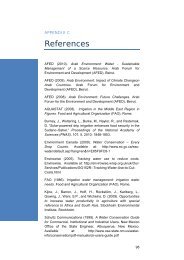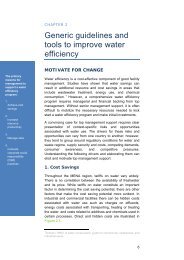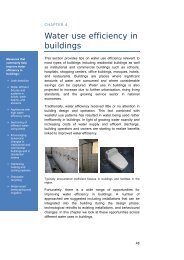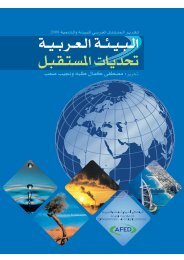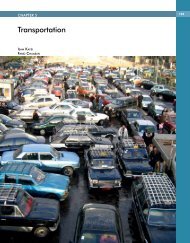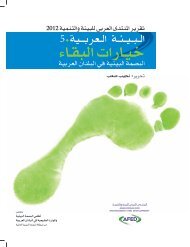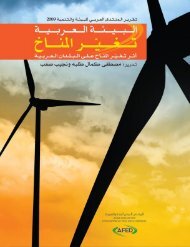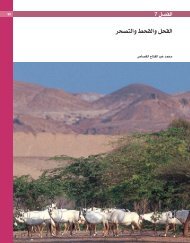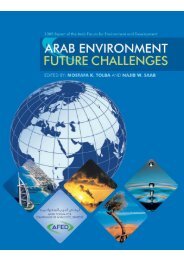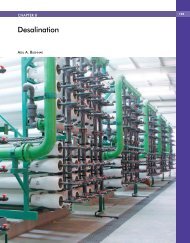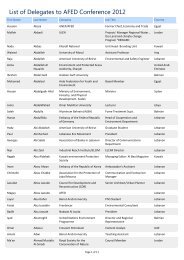Impact of Climate Change on Arab Countries - (IPCC) - Working ...
Impact of Climate Change on Arab Countries - (IPCC) - Working ...
Impact of Climate Change on Arab Countries - (IPCC) - Working ...
Create successful ePaper yourself
Turn your PDF publications into a flip-book with our unique Google optimized e-Paper software.
28<br />
CHAPTER 2<br />
GHG EMISSIONS: MITIGATION EFFORTS IN THE ARAB COUNTRIES<br />
gas, cement and steel and electric power plants.<br />
CO 2 has been injected and stored in oilfields as a<br />
means to enhance oil recovery since the late<br />
1970s. Currently, the estimated global geological<br />
storage potential in depleted oil/gas fields equals<br />
900 Gt <str<strong>on</strong>g>of</str<strong>on</strong>g> CO 2 (IEA, 2006). The <strong>IPCC</strong> Special<br />
Report <strong>on</strong> Carb<strong>on</strong> Dioxide Capture and Storage<br />
recently stated that: “CCS has the potential to<br />
reduce overall mitigati<strong>on</strong> costs and increase flexibility<br />
in achieving greenhouse gas emissi<strong>on</strong> reducti<strong>on</strong>s.”<br />
(<strong>IPCC</strong>, 2005).<br />
The first major locati<strong>on</strong> where CO 2 was stored in<br />
geological formati<strong>on</strong>s as a climate change mitigati<strong>on</strong><br />
opti<strong>on</strong> was under the North Sea. In 1996,<br />
StatOil, an oil company, started removing CO 2<br />
from the natural gas and injecting it into a massive<br />
saline aquifer located 800–1000 meters<br />
under the North Sea (IEA, 2006).<br />
Algeria hosts <strong>on</strong>e <str<strong>on</strong>g>of</str<strong>on</strong>g> the world’s three largest<br />
dem<strong>on</strong>strati<strong>on</strong> sites <str<strong>on</strong>g>of</str<strong>on</strong>g> CCS which is the BP’s In<br />
Salah project, where CO 2 is captured and stored<br />
in a gas field. This dem<strong>on</strong>strati<strong>on</strong> project <str<strong>on</strong>g>of</str<strong>on</strong>g>fers<br />
an opportunity to collect baseline and m<strong>on</strong>itoring<br />
data that is not associated with enhanced oil<br />
recovery. The project is aimed to ensure that<br />
secure geological storage <str<strong>on</strong>g>of</str<strong>on</strong>g> CO 2 can be costeffectively<br />
verified, to dem<strong>on</strong>strate to stakeholders<br />
that industrial-scale geological storage <str<strong>on</strong>g>of</str<strong>on</strong>g> CO 2<br />
is a viable GHG mitigati<strong>on</strong> opti<strong>on</strong>, and to set<br />
precedents for the regulati<strong>on</strong> and verificati<strong>on</strong> <str<strong>on</strong>g>of</str<strong>on</strong>g><br />
the geological storage <str<strong>on</strong>g>of</str<strong>on</strong>g> CO 2 , allowing eligibility<br />
for GHG credits in the internati<strong>on</strong>al carb<strong>on</strong><br />
market. It is worth menti<strong>on</strong>ing here that CCS<br />
projects are not yet eligible under the current<br />
modalities <str<strong>on</strong>g>of</str<strong>on</strong>g> the Clean Development<br />
Mechanism (CDM) <str<strong>on</strong>g>of</str<strong>on</strong>g> the Kyoto Protocol.<br />
The Algerian project involves separating CO 2<br />
from natural gas at the In Salah gas facility. The<br />
CO 2 is being re-injected into a sandst<strong>on</strong>e reservoir<br />
for permanent storage. In this Gas project, the<br />
natural gas has a high level <str<strong>on</strong>g>of</str<strong>on</strong>g> CO 2 which is captured.<br />
The CO 2 free gas is processed for distributi<strong>on</strong><br />
as sales gas. About 1 milli<strong>on</strong> t<strong>on</strong>s per year <str<strong>on</strong>g>of</str<strong>on</strong>g><br />
CO 2 is compressed before it enters the CO 2<br />
pipelines. These pipelines transport the CO 2 to



